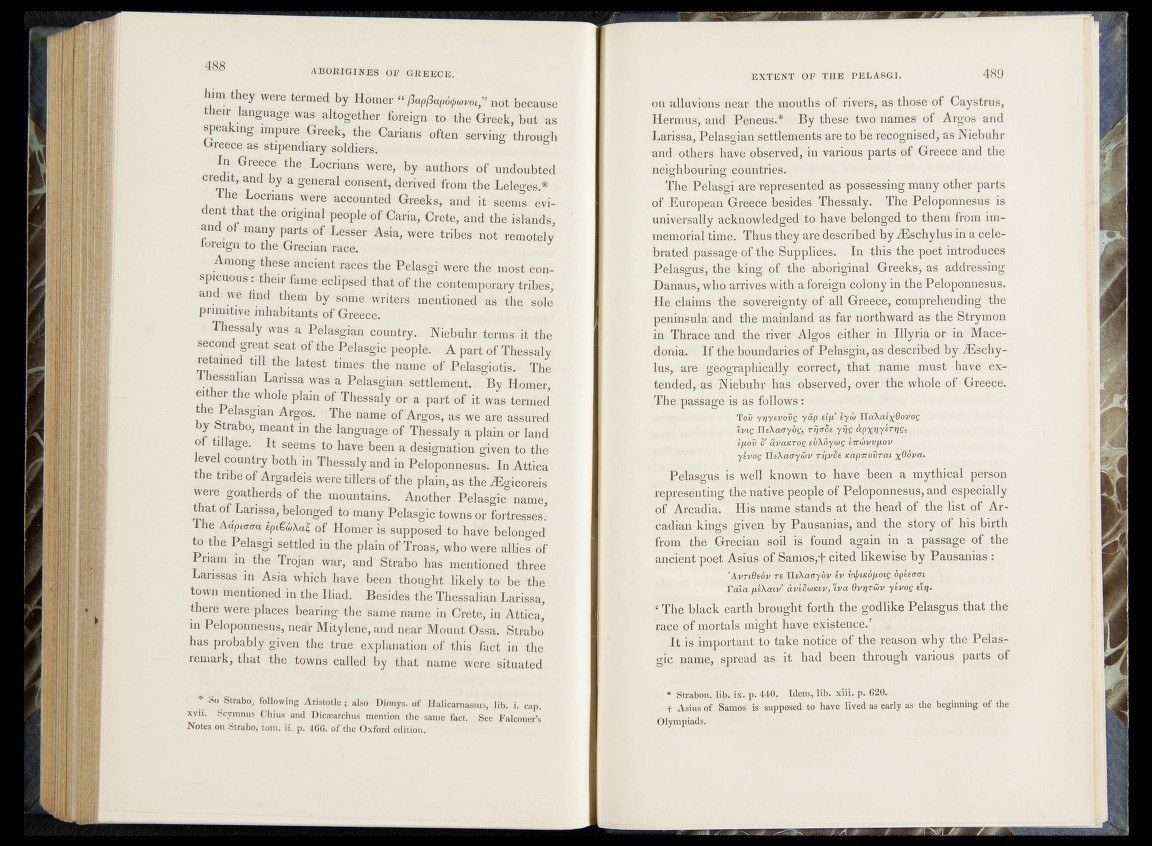
him they were termed by Homer not because
their- language Was-' altogether fcreign-tot.the Greek, bwtiias
speaking impure Greek, the Carians often.serwng through:
Greece as stipendiary; soldiers.
In^GIreece the Loerians were, by authors of undoubted
credit, and by a gener^eonroMt^derived from the Leleges*
^ >4heJLpcrians were accounted Greeks, , and -it< sterns evident
that the original people of Caria, Crete, and the islands,
and of many parts of Lesser Asia, were tribes not remotely
foreign to the Grecian race.
Among these ancient races the Felasgi were the mos&ebm-
spicuoas: their fame-eclipsed that of the' contemporary tribes,
an .we find them by some* writers mentioned* as the\s6Ee
primitive inhabitants of Greece.
| Thessa,y was a Pelasgian country.. Niebuhr terms it the
second great seat of the Pelasgic p e o p le d A part of Thessaly
retained till the latest times the name of Pelasgfotfe- The
lhessalian Larissa was a Pelasg i^ se ttlem eh t. By Homer,
either the whole plain of Thessaly o r a part of- it was .termed
he ^Pelasgian Argos. The name -of Argo's, ^ we> are aisled .
by Strabo, meant in the language of Thessaly a plain or land
0 tillage. I t seems to have been a designation given to The
evel country both in Thessaly and in Peloponnesus.: In Attica
the tribe of Argadeis were tillers of Hie plain, as the ASgicqreis
were goatherds of the mountains. ’ Another Pelasgic name,
that of Larissa, belonged to many Pelagic-towns or fortresses:
1 he Aapiava Zptt&XaZ of Homer is supposed to have belonged,
to the Pelasgi settled in the plain of Troas, who were allies of
Priam in the Trojan war, and Strabo has mentioned three
Larissas in Asia which have been thought likely to. be the
town mentioned in the Iliad. Besides the Thessalian Larissa,
there were places bearing the same name in Crete, in Attica,
111 Peloponnesus, nesfr Mitylene, and near Mount Ossa. Strabo
has probably given the true, explanation of this fact in the
remark, that the towns called by that name were situated
* SfkStrabo, following Aristotle; also Dionys. of_ Halicarnassus, lib. i. cap.
xyii.' Scymnus Chius and Dicasarchus mention the same fact. i. See Falconer’s
Notes on Strabo, tom. ii. p. 466. of the Oxford edition.
on alluvions near^thêfebuths d r iv e r s , as those of Caystrus,
Hermus, and' -P^ieusJ* By thes<l$two names of Argos and
Larissa, Pdlasgjau settlemcnt^areTo beT'eébgnised^as Niebuhr
and others havefbbservM^in various parts of’;Greeee and the
neighbouring countMêi'f^5
Th&:Pela#gimfe'rëpïesentèd as possessing many other parts
of European G,rebec Resides Thessaly. v/Thfe Pbloponnesus is
universally acknowledged,To havé belohged to them from im-
mêmorialTiine.>>'ThüsThey aré#bg.crib'ed’%y-JEschylus in<a celebrated
passagb^thfe-SuppM^b^^ In * this- thefpèët introduces
P e la sg i,T h e tóngtofitffê- abéiuginkL G re ek s afe- addressing
Danaus, who arrivesw ith1 a* forei^n^Golbhy-iin thepfeloponnesuS.
He. claims • tlmt^sovereignsf^of' all G^ëê||l; comprehending the
peninsula*'and the mainland asTar northward as-the Stryrfibü
in Thracenahd-ythe river: Algos ^either P^Èl^Ma-oddh' Macedonia*:
If ftebbnndai;fe§;of Pelasgia^ds described by JEsehy-
lus^ikre^||e//graphically:-correc% th a t' name 'must-have* extended,
iés Niebuhr .has bbservfedl dvërThe whole oP Greece.
.The^passage ik-as follows’-*:
v ToS y-rjy-sWS^I yapijsx/k s ovöq
kfiov S’l^.aKTf
" ^ y 'sv o } IttKaafyt»wyfjvSi& KafiTropraFffitwaT^.
Pelasgus jis ^elfjknown T a h’ave^ been a mythical person
representing thé native people of Peloponnesus, an^&especially
ortArcadia. His name stands;at the head of .the list of Arcadian
kings given p y Pausanias, n n d , the. story of his birth
from fth ^ö re e jan soil,is found again, in a passage of thp
ancient poet Asius of Samos,t cited likewise by Pausanias :
’AvriOeóv re neAagydv sv vipiKÓuoi&óq&strari ^
Fata fiekaiv avédhvev iv a QvurStv yevog eit].
‘ The, black eartli brought forth theSgdlike Pelasgus that the
race of mortals might have; exjslbg
I t is important to take n o te s of the reason why the Pelas-
gjjc name,; apïgad a s . its had been through various parts of
* Strabon. lib. ix. p. 440. Idem, lifep xiii. p. 620.
+ A.sius of Samos is supposed to have: lived as early as the beginning of the
Olympiads.